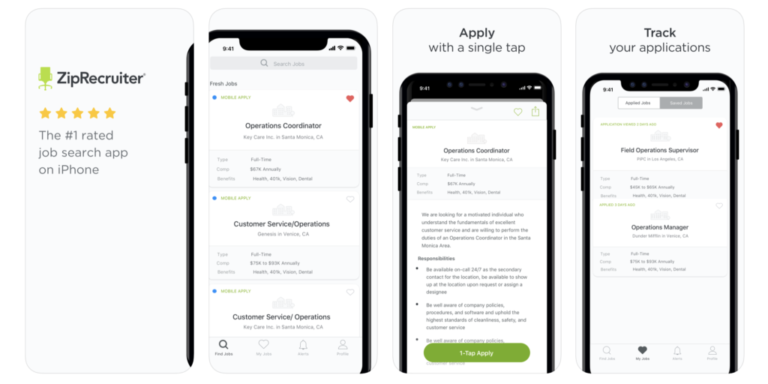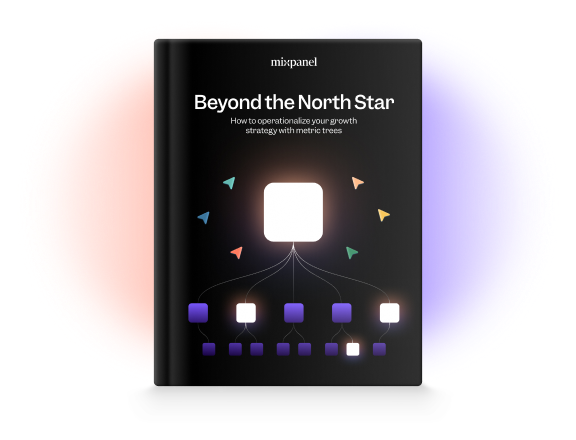Metrics that matter to ZipRecruiter
In this installment of “Metrics That Matter,” we talk to Akio Bandle, the Senior Product Manager, Mobile, at ZipRecruiter. Akio currently manages ZipRecruiter mobile apps, including the number 1 ranked job search app for iOS.
Here’s what you’ll learn:
- How the highest rated mobile job search app uses metrics to maintain its market position
- How ZipRecruiter uses Mixpanel to minimize reliance on their data science team
- How data gathered through Mixpanel helped ZipRecruiter refine its product offering for an underserved user group
Mixpanel: Tell us a little bit about the company. How do you differentiate from your competition?
Akio Bandle: ZipRecruiter is a two-sided online employment marketplace between job seekers and employers. Our mission is to actively connect people to their next great opportunity. Right now, we have a very low unemployment rate, and growing demand for skilled labor, so there is a constant demand for talent.
What makes us different? Our AI matching technology. We look at our database of job seekers, and find those that are relevant to the employer based on the job seeker’s work experience and previous job search history. We not only find the right candidate for the employer; we flip the hiring process on its head by letting job seekers opt-in to get recruited. Employers can then proactively invite job seekers to apply for jobs.
Mixpanel: What are the biggest pain points that your product is solving?
Akio: The job search process is very stressful: you have to fill out all these long application forms, usually different ones for each job, so you have to repeat the same thing over and over again. And then you send your application out into the ether, and you don’t know if the employer looked at it or what they think about it. It’s what we call the “resume black hole.”
At ZipRecruiter, we’re working to address these issues. For example, job seekers on our platform get a notification when an employer has viewed their application or has given their resume a thumbs-up. By showing them that engagement, job seekers know when their resume is actually being looked at.
Those are some of the fruits of our success, including with our app, which is rated at 4.9 for iOS–the highest rated mobile job search app right now. And a big reason why is because we’re eliminating major pain points for a job seeker.

Mixpanel: Tell us about your role. What does the day-to-day look like for you as a product manager?
Akio: I’m in charge of the 10-person mobile team, whose job is to manage the job search apps on Android and iOS. As job seekers go more towards mobile for their job search needs, we’re seeing traffic and downloads go up significantly, year over year.
I try to come in a little bit before everyone else is in to look at how my tests are performing. We A/B test literally every feature that we ship. And so I’m looking at our metrics, I’m looking at how app downloads are doing, and at some of the reviews we’re getting. This morning I built out a whole Mixpanel dashboard for a test I just launched.
Once 11:00am rolls around, it’s meeting time, talking to different stakeholders about different projects. Any project that we launch requires buy-in from legal, from design, and from the tech team. I spend a lot of my day working on getting that buy-in, or maybe the marketing team has some questions about the mobile app, and so they’ll schedule time with me. I’m in meetings for the rest of the day, and then if I have 30 minutes between meetings, that’s my time to reply to emails and Slack messages.
I also block out time during the middle of the week, so that I can actually work on new things (new product research, brainstorming, etc.). I front load as many meetings as possible in the beginning of the week, and then on Thursday and Friday, I have a lot more time to actually do work-work. I really try to maintain that cadence, but it’s easier said than done.
Mixpanel: What are some of the challenges you’re facing in product development and measuring product success?
Akio: One of our key goals is to maintain a healthy ecosystem of happy employers and happy job seekers. On the employer side, we want to drive hires. If an employer is getting tons of irrelevant candidates for their job, that’s a negative experience. And then there are additional challenges, like how do we measure quality? Those are things that we’re constantly talking about in product and analytics meetings.
Mixpanel: Let’s dive deeper into those metrics. Which KPIs does ZipRecruiter use to track business health and product success?
Akio: On the job seeker side, we’re looking at North Star metrics, like MAU, as a way of continuously growing. One of our big goals this year is to help more job seekers find great jobs. We track such metrics as the percentage of job seekers who are invited to apply to jobs. We’re also looking at job seeker happiness metrics, like Net Promoter Score (NPS). I’m continuously trying to increase the percentage of job seekers who download the app and apply to jobs. I also look at our app ratings. That’s something that matters to us because it’s a good indication of whether job seekers are happy with their ZipRecruiter experience.
One of our most important metrics is the conversion rate, which helps us determine what percentage of job seekers come into our platform, find a job that’s relevant to them, and then complete the apply flow.
Mixpanel: Have these metrics and your dashboards changed over time?
Akio: We have certain cornerstone metrics that are never going to change. But as our business evolves, we’ve started to tweak and then favor some metrics over others to make sure we’re addressing our changing needs, especially as we increasingly serve enterprise employers.
Mixpanel: How do you use all these metrics to make decisions on your team, and as an organization?
Akio: We do a lot of A/B tests. If there’s one feature that is meant to drive more job seekers to apply, then that’s the conversion metric that we use to A/B test a particular project or feature.
Mixpanel: What is different about tracking metrics at ZipRecruiter versus some of the other companies that you’ve worked for?
Akio: There’s a lot of discipline in how we approach our decision-making. Even though we do have a lot of engineering and tech resources, we’re very careful about how we employ them. We rely more on a lean startup type methodology–running smoke tests, doing user interviews, employing only those tech resources that we need to validate certain ideas or projects.
Mixpanel: How has using Mixpanel changed the way that you interact with your data science team?
Akio: That’s actually the reason why we use Mixpanel–because we have a lot of analytics needs, and we don’t want to overload the data science team. Mixpanel lets us outsource some of those needs, and lets the product managers do their own ad hoc analysis, so we can leave the bigger questions to the analytics team.
Mixpanel: Can you give us an example of some trends that you’ve discovered through data? A data point that you found in Mixpanel that made you change something in the product?
Akio: It’s interesting to track what searches job seekers run. We’ve noticed that a lot of them run blank searches, or searches that don’t pertain to a particular job title. Why do they do that?
We have a few hypotheses. Maybe the job title is not what necessarily matters to them. Some people are more concerned about finding a job that lets them drop off and pick up the kids at school, so what they really need to know is whether a position is close to the schools. A lot of people who just graduated from school don’t know what they want to do as a career. Lots of people are coming back to the workforce after some time away. We’ve learned that we need to create different search pathways not related to job title for job seekers. We’re looking into skills-based matching, or quizzes that provide an idea of what interests and skills match the jobs available in a given area, or getting a better understanding of what job seekers really care about most, and then prioritizing those things in our search results page.


